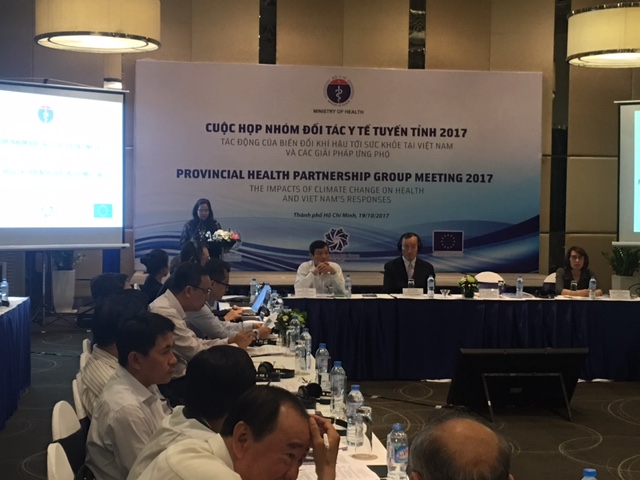Provincial HPG Meeting 2017 in Ho Chi Minh City
Since 2014, the Ministry of Health (MOH), with the focal point of International Cooperation Department (ICD), in coordination with the Development Partners have organized annually provincial HPG meeting - with the specific themes based on the local concerns and interests. These meetings aim at strengthening the connection between central, local bodies and development partners; promoting the participation of the respective provinces/cities in the high-level policy dialogue forum; and at the same time, share the health issues in the provinces with the participants. The 2017 HPG meeting held in Ho Chi Minh City on October 19 with the theme "the Impact of Climate Change on Health and Viet Nam’s response", was the 4th Provincial HPG meeting following the Provincial HPG meeting in Nghe An province (2013), Yen Bai province (2015) and Lao Cai province (2016).
The 2017 provincial HPG meeting, which was jointly held by ICD and the Health Environmental Management Agency (VIHEMA) of MOH with the support of the World Health Organization (WHO). 150 participants were from MOH Departments/Administrations, agencies under MOH including universities, hospitals, and institutes; the Ministry of Natural Resources and Environment (MONRE), Departments of Health (DOH); Development Partners; local and international non-governmental organizations; research agencies; and private sector. Dr. Kidong Park, Representative of WHO in Viet Nam attended to the meeting as co-chair and delivered the opening remarks.
The 2017 provincial HPG Meeting is of great importance because at present, climate changes affect not only a separate province/city or region but also Viet Nam as a whole. Noteworthy, cities and provinces in the Mekong Delta are now hit by climate change and rising sea level. Among the Mekong Delta provinces, Ho Chi Minh City, as the largest and most populous city, is now experiencing the negative effects of climate change including health problems such as fever blood, hygiene related issues.
Concluding the meeting, Dr. Kidong Park said that Information, data and/or experience on climate change resilience should be shared among provinces because the experience of one province may benefit other provinces; a national action plan to respond to the climate change should be developed; the activities to mitigate climate change without the governmental aid should be proactively implemented. In closing, he said that WHO committed to supporting the member countries in this matter and that WHO would cooperate closely with agencies through the MOH to develop a comprehensive action plan on climate change and implement this plan.
Following the concluding remarks of Dr. Kidong Park, Assoc. Prof. Dr. Tran Thi Giang Huong highly appreciated commitments of WHO and other DPs to support MOH Viet Nam in mitigating the impacts of climate change in the coming time. She concluded that climate change is one of the biggest health problems in the 21th century and by mitigating the impacts of climate change, the global health would be improved.











